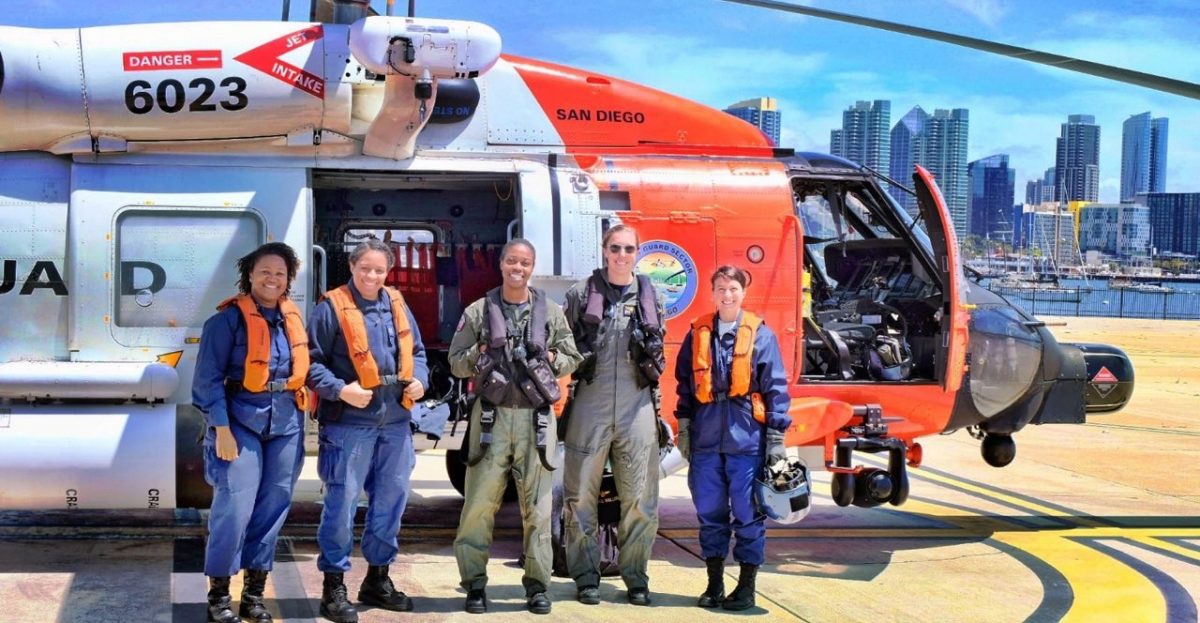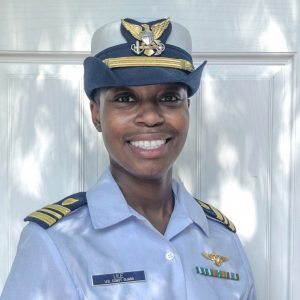
One Last Flight. Before coming to Georgia Tech's Daniel Guggenheim School of Aerospace Engineering to earn her master's degree, Lt. Commander Chanel Lee took one last flight with some of the other women in her unit in San Diego. Lee will complete her graduate work with Prof. Julian Rimoli.
 |
| Lt. Commander Chanel Lee Georgia Tech Aerospace Engineering Graduate Student |
Two years from now, Chanel Lee plans to leave Georgia Tech, master's degree in hand, to resume her duties as Lieutenant Commander in the United States Coast Guard.
"I'll be taking on the challenge of our aging aircraft," she says in a tone that is both humble and determined. "I'll be assigned to improve our sustainability."
If those plans play out the way the rest of Lee's life has, her story will be more than a master's degree in aerospace engineering. Lee's too smart to predict exactly what that story will include, but life has taught her to not argue that point.
"I never expected to be where I am now, but I've always been excited about the next challenge, the next opportunity to be better," she says. "My growth has always occurred in the challenges."
Those challenges have produced mightily for the Richmond, Virginia native.
What started out as a post-high school stint in the Coast Guard led Lee to earn a BS in civil engineering from the elite United States Coast Guard Academy. Lee is one of just five African American women pilots in the Coast Guard - the first to fly an MH-60 Jayhawk helicopter and the first to be assigned to flight school straight from the Academy. She has flown counter-drug missions in the Caribbean and overseen rescue efforts during the California mudslides and wildfires.
 |
| The Newest Lieutenant Commander. Flanked by her supervisor, Commander Tim Williams, and her mom, Betty Jones, Chanel Lee is seen here in late July, when she was officially commissioned as Lieutenant Commander Lee by the U.S. Coast Guard. Reflecting on that accomplishment, Lee said "My mom has inspired me with the way she lives her life. She is the strongest person I know and she is relentless. She was more convinced than I was that I could do this. And I wouldn't have been able to without her." |
That's a pretty big delta for a high-school senior who joined the Coast Guard after 9-11 "to help save lives."
"I didn't know about the Coast Guard Academy when I went to boot camp, and my supervisors would have been happy if I'd just stuck to my job. Because the Coast Guard needs you to perform. And I did perform. But I was always asking my supervisors about how to further my education. And I always worked hard, volunteered for new duties," she said.
One of those 'new duties' was a chance to practice hoisting loads with the Coast Guard helicopter crew. It stands out in her memory:
"I asked a BM-3 'What do you need to do to get up there?'" she recalls. "He said you have to be an officer and get selected for flight school, which were things I was far way from being able to do. But I believed him. And I kept it in my head, even if I didn't think about it again until my senior year at the Academy."
After about a year in the Coast Guard, Lee's supervisors realized that she was "Academy material." A particularly observant lieutenant helped her put together a successful application package.
"I believe that Lieutenant reached out to me as a woman, but also because she recognized the determination and ambition that I carried every day."
Once in the Coast Guard Academy, Lee found herself among other high-achieving, ambitious men and women. But there were differences. For one, most of her classmates had come straight from high school -- a one-year age difference that symbolized the kind of privilege that Lee did not enjoy. Defying that privilege, then, was a great equalizer. Describing that struggle, now, brings her great equanimity:
"For me, this was my second chance, my only chance to earn my degree just like they were," she says. "I was there to work hard, to perform. And that's what I did."
Lee was also the only Black woman in her graduating class -- a distinction that continues to make her stand-out in her chosen career. She acknowledges that this was not always easy, but, again, her love of a good challenge triumphed.
"Attending the Academy was exciting and so very very rigorous. It changed the trajectory of my life in ways that I could never have expected. There was racism, and sexism, yes, but there were also people there, friends who understood the nuances of the experience and would not let me fail.
Lee's support system -- her Coast Guard family and her birth family -- were critical to her success when she found herself in flight school, one of the most competitive environments in the military. She chuckles a little as she once again tries to describe the enormity of the challenge.
"They tell you that, with your [undergraduate] engineering degree and your good grades from the [Coast Guard] Academy, flight school will be easier. [She laughs]. But it's not easy. It's hard in ways I'd never known before. A lot of my classmates had flown little Cessnas before they got there. I had never piloted a plane. They had pilot's licenses. I did not. On top of that, the Navy -- which runs the flight school -- looks at flight school as a way to accomplish attrition. So they are looking to thin out the ranks. You get three 'fails' and you are out."
Lee continued to perform well on written exams, but describes her first attempts at flying as 'counter-intuitive.' On one critical test - a formation flight rendez vous- she was unnerved by the requirement that she fly very close to another prop jet. Her head kept jerking back as she approached the other jet, causing her instructor to fail her. She was given the opportunity to try again three days later.
"So that's when one of my classmates, Thomas Cameron, stepped in. He took me to the simulation lab that weekend and we practiced that maneuver at least 50 times," she said. "He was not going to let me fail."
Still feeling wobbly, she called a cousin back home the night before the exam. He wasn't having it:
"I told him I didn't think I could do it, that I was going to fail," she said. "He listened to me but then he told me something that changed me. He said I was having the experience of his lifetime, that he never had the chance to even try to succeed at something like this but would - if he had the chance - try, and try hard. He said he knew if he tried, he'd do it."
In an instant, his excitement became hers. His words re-ignited her passion -- for hard work, for ambition, for giving it her all. She passed the test, of course, but it's the memory of her triumph over fear that continues to shape her as she begins her studies at Tech.
"Since coming to Tech, I joined the Yellow Jackets Flying Club where I met a ROTC student who wants to go to flight school. So I'm going to connect with her," she said. "It's really full circle, for me: I've learned so much in the Coast Guard and in school, but, again, at the end of the day, the most important thing is to work your hardest to help another person."

The Fab-5. Lt. Commander Chanel Lee, second from left, is seen here as a member of an elite group: the only five Black women to ever fly in the Coast Guard. "We were all able to attend an event at the Tuskegee Historical Site where Lieutenant Ronaqua Russell was awarded an Air Medal for her valiant efforts during Hurricane Harvey in Houston," says Lee. "This was one of the very few times we’ve all been together."